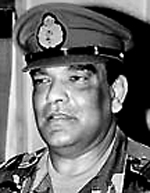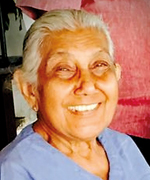Appreciations
View(s):No one would deny him the title ‘officer and a gentleman’
 Lt.Gen.Parami Kulatunge
Lt.Gen.Parami Kulatunge
“A true leader has the confidence to stand alone, the courage to make tough decisions, and the compassion to listen to the needs of others. He does not set out to be a leader, but becomes one by the equality of his actions and the integrity of his intent.” – Gen. Douglas MacArthur
Ministerial motorcades with backup commando escort and outriders whizzing past us on the busy streets in and around Colombo were a common sight in 2006. But, Lt. Gen.Parami Kulatunga travelled to Army Headquarters in Colombo from his quarters in Homagama every day in a marked green Peugeot, bearing a military licence plate, followed only by a beat up pickup truck. He had no outriders, no protective units assigned to him, no bullet proof or bomb proof car. He wanted quarters inside the Army Headquarters (AHQ) complex but it was denied to him. So he had little choice.
As the third highest ranking officer in the Army, he travelled 28 kms to the Army Headquarters in Colombo, spending two hours each day on the road covering 56 kms both ways. The fact that he travelled to work every morning along the High Level Road quickly became a public secret. Worse, all this was happening when just two months before – the Army Commander was targeted and blasted right inside the Army Headquarters!
This time, they very easily chose a point between Pannipitiya junction and Maharagama town. On the morning of June 26, 2006 a motorcycle packed with explosives rammed into his car reducing it to a mangled and smouldering heap. Parami died instantly, newspaper in hand, his body ridden with ball bearings along with his trusted Sgt Gomes, Corporal Buddhika and an innocent bystander. Even worse, he had just been betrayed by one of his own men.
I was one of the first to stand beside him when he lay on that cold grey slab at the General Hospital. After all the trauma, his face was (unbelievably) so serene. Many laid the blame squarely (and fairly) on the government for having neglected to protect such an outstanding and astounding military man who had proved his mettle on (and off) the battlefield and was indeed a priceless resource in the country’s war with terror and beyond.
His family and friends were devastated. They thought he was invincible. I know of some who never recovered from the news, living now in eternal grief. His death evoked extraordinary indignation from the public.
Parami was the youngest of Lionel and Leela Kulatunga of Lewella, Kandy and the adored, beloved and deeply missed brother of Lumbini, Samantha and Indu. A die hard Trinitian, although he played rugby his passion was for cadetting. He ended up as the Senior Regimental Sergeant Major of the Senior Cadet Platoon.
He decided to join the army in 1971 when the country was in the throes of the JVP insurgency and was commissioned into the elite Gemunu Watch. His detailed and impeccable 35-year military record is easily accessible so I will not delve too much on it.
He played a major role in the Vadamarachchi Operation of 1987 when the Jaffna peninsula was liberated under Lt. General Denzil Kobbekaduwa and also the Operation Balavegaya I and II in 1991 and 1992 which secured Elephant Pass. He was the General Officer Commanding the 52 Division that stopped the waves of the advancing LTTE cadres in Eluthumattuval after the Elephant Pass camp was overrun. Parallel to that he was an integral stakeholder of the then, ten Kinihira Operations which were meant for the capture of Jaffna. He also played his part in the Valampoori, Yal Devi and Jayasikurui Operations. His decorations included Rana Sura Padakkama (RSP), Uttama Seva Padakkama (USP), Sri Lanka Armed Services Long Service Medal, Riviresa Campaign Services Medal, Poorna Bhumi Padakkama, North and East Operations Medal, Desha Putra Sammanaya amongst others. In 2008, he was posthumously awarded the Vishista Seva Vibhushanaya (VSV), the second- highest ranked medal for gallantry.
Parami could very comfortably wear the badge of an officer and a gentleman. Nobody would ever deny him that. The manner in which he established rapport amongst the civil officials, religious dignitaries and members of the public in Jaffna and for that matter wherever he was stationed was inspirational to all his junior officers and soldiers around him. I have personally seen how much he has done for disabled troops at Kuruwita. Then, after the tsunami he spearheaded a project for the Talwatte family to build and deliver 12 homes in Panama for the displaced. This was an incredible feat by one family which would not have been possible without Parami.
Parami was a bulwark to his large and endearing Talwatte and Kulatunge families. Like with all his friends and colleagues he always found time to visit his aging aunts and uncles, lift their spirits, listen with patience to their woes and swiftly reconcile them when he suspected disunity. He met up with his 42 cousins and their spouses regularly but would deftly manoeuvre himself out of difficult situations when he was asked sensitive and probing questions on his work and national security. He loved his family and would magically defuse any crisis that was presented to him.
He was there for everybody and caste, creed or religion was never a criterion during his association with people. I remember when I had to undergo surgery he was there when I was wheeled in and there when I was wheeled out. And then, when I lived in denial he would visit me many times unannounced and prop me up with wonderful words of encouragement and hand me inspirational books to help improve my sagging coping skills. That’s the kind of man Parami was and I am sure there are so many other people out there who have been touched by his presence at vital moments in their lives.
Parami was a devout Buddhist and although he struggled at times to balance the Dhamma with the war he was fighting I am sure he finally succeeded in achieving the harmony he sought. For he did not pay mere lip service to the Buddha, Dhamma and the Sangha but he truly took them as his refuge at all times. This was plain to see by all of us who knew him intimately.
And, as it has been said, he was bold, dashing and handsome, relentless in combat, magnanimous in victory and gracious to his vanquished enemies.
Jomo Uduman
My gentle Akka who was a guiding light to many
 Peace Emilda Devapriya Somaratne (nee Karunaratne)
Peace Emilda Devapriya Somaratne (nee Karunaratne)
“ For to me, to live is Christ, and to die is gain” -Philippians 1:21
My beloved sister Devapriya went to be with her Precious Lord Jesus on December 21 last year. It’s hard to accept that we won’t see her smiling face, or hear her gentle voice, encouraging, comforting and guiding us.
Akka was born on April 1943, the second in a family of five. She was just fifteen months older than I. For some reason that I cannot now recall, we were in the same class in school from Grade One. Though we were totally unlike each other in looks and temperament, we were often mistaken for twins. We were the best of friends, studying and playing together. It was hard for me when we were separated at the O’ Level class, when she went into the Arts stream as she excelled in Arts subjects, and I was selected to do Science.
Akka made a distinctive contribution as a student to Methodist College, being appointed a prefect for two years; as House vice captain for one year, and captain the other. She was also the leader of the Sinhala debating team, and a member of the English debating team.
She entered the University of Peradeniya in 1961 to read for a Bachelor of Arts Degree in Economics. During this time there was a revival of Sinhala Drama under the influence of Prof. Ediriweera Sarathchandra. This exposure gave her the vision and skill to direct “Chora Pabbathaya” and “Sakkaya Ditthi” two highly successful, stylized Sinhala dramas.
She married Professor G.P.V. Somaratne in 1966 and accompanied him when he went to London to read for his PhD in History. She was his devoted and caring wife for 52 years.
On their return to Sri Lanka in 1969, she joined the tutorial staff of her alma mater Methodist College. She was a gifted teacher, having the skill to kindle an interest in the subjects she taught: History, Sinhala and Economics, in the O’ Level and A’ Level classes. She was a strict disciplinarian, but earned the warm affection and loyalty of her students, as they sensed her genuine concern and interest in their welfare.
Students and staff alike were devastated when akka gave up teaching in 1982. She had been invited to join a team who had taken on the challenge of editing a new Sinhala translation of the Holy Bible, spearheaded by the Ceylon Bible Society. She felt that part-time involvement was insufficient to do justice to such a tremendous task. Though she loved being a teacher, she willingly gave it up, as she was convinced that this was God’s calling for her. She was also responsible for editing a Sinhala Study Bible, which had hitherto not existed. She got actively involved in supporting her husband in helping with research, editing and proof-reading the many books he wrote in the past two decades which have enriched Christian literature. She was indeed “the wind beneath his wings”.
Akka was the epitome of simplicity often dressed in white. She shunned jewellery, wearing only a simple pair of ear studs. Her adornment was her beautiful smile, which radiated her goodness and inner peace. Akka’s compassion and caring knew no bounds. She would reach out to those in need, those who were hurting, and was able to comfort, encourage and heal. She was always ready to lend a helping hand, paying the school fees of less affluent students at Methodist College, providing a regular supply of dry rations to families who were struggling economically, all without publicity or fanfare.The daily maid who helped her with cleaning, tearfully told me that akka had given her Rs. 1000 to buy Christmas gifts for her two little boys just before she was admitted to hospital in December.
Akka was a gifted speaker, but she never showed off. She never used big words or high flown theology. Her words were simple, and touched the hearts of her listeners, and made an indelible impact on them. When she prayed, we felt that she had a ‘hot line’ to Jesus.
Akka has a son Dasharatha (a Chaplain in the US Army) and a daughter Prarthana Devi (a primary school teacher), both who reside in the US. She provided them with love, support, and guidance and most of all inculcated in them a steadfast love for their Saviour Jesus. These two well balanced, outstanding young people are witness to her good parenting. Akka has eight grand children and five great grand children. She was the beloved “Priya akka” to her many cousins and a much loved “Loku achchi” to her grand nieces and nephews.
After akka’s demise, many of her past pupils at Methodist College, scattered in Sri Lanka and abroad contacted me to express their sympathy. Many stated that they are who they are today because of the sound moral and Christian values that were instilled in them by their beloved teacher at a young and impressionable age.
Goodbye my dearest akka. Your departure has left an aching void in our lives. We will hold you in our hearts, and find comfort in the sure knowledge that you are safe in the arms of Jesus. We look forward to the glorious day when we will meet again, beyond the sun set.
Dr. Suriyakanthi Amarasekera


